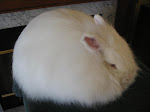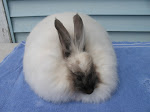---another post from the old blog
I have been thinking quite a bit lately about Stress in rabbits. I have always been a strong proponent of routine and consistency with animals, and I believe this idea translates to every other thing that we do in our lives. When I first got into bunnies I realized that the calmer the surroundings of the herd were and the more consistent their daily routine, the less health problems they seemed to have. I often heard (and continue to hear today) stories of problems people are having with their bunnies' health: breeding problems, conditioning problems, woolblock problems, eating problems, weight problems, etc. etc. etc. When you question them further about the details, it almost always comes out that some sort of inconsistency in management is taking place that the person often has no idea is having any effect on their herds. What exactly does 'inconsistency' mean? Let's use feed as an example. Say you buy a certain feed for your bunnies that is considered a 'quality pellet' for angoras, and begin feeding it. After a certain period of time you notice that the condition of your rabbits has not improved despite the fact that you have switched from a standard pellet to one that contains more protein to sustain and grow a wool coat, and you were told by breeders with excellent stock that you would get results. All other things being equal, it is now time to go beyond your feed and take a look at your feed routine. Begin by asking yourself these simple questions:
1) Do you feed your bunnies at the same time every day?
2) Do you feed your bunnies the same amount every day (measured)?
3) Do you continue to feed the same brand without switching to other feeds when you run out--substituting cheaper pellets to stretch the expensive stuff, let the bunnies go several days on hay and grain before picking up the next batch of feed, and so on and so forth?
4) Do you add lots of treats to the bunnies' diets that are not technically 'bunny approved'? For ex, do you allow 'human' foods such as processed foods or foods that contain sugar, artificial ingredients, and other additives? Are treats given often?
5) Do you supply fresh water daily?
6) Are parts of the bunnies' individual days unpredictable as a rule?
The point I am trying to make is that simply buying good products won't do the job in producing high quality show bunnies and excellent woolers. The ingredient that is much more important (that we neglect to mention or think about) is the importance of routine. Rabbits are flight animals, which dictates that they live in a constant state of alertness and experience chronic levels of stress. In Nature this is beneficial because it enhances survival, but in domestic rabbits it can pose serious problems in terms of achieving maximum growth, optimal weight, and most of all, good condition. In human beings Stress is at the root of serious health problems, and in children it has been connected with learning difficulties, psychological problems, and interference with physical growth in some cases. Rabbits are even more susceptible to stress than people, so in order to raise good stock we need an environment that is healthy and a routine that is consistent and regular.
Pick one time of day to feed your bunnies and stick with it. Try aligning your feed schedule with the time rabbits normally eat in the wild, (near or around dusk), and fill their dishes in the late afternoon or early evening. Feeding on a schedule decreases stress by allowing the herd to know exactly when it can expect to be fed. A regular schedule also leads to improved eating and more predictable weight gain.
Always feed your bunnies the same amount each day. Keep an old measuring cup in your feed bucket and bring it out with you religiously to measure feed for every rabbit every day. If you need to increase feed for whatever reason (wintertime, does with litters, etc.), do so slowly, at an amount of no more than 1/8 cup extra feed per day until you reach the desired ration. Erratic feeding leads to upset stomachs, and upset stomachs lead to bunnies who won't eat or drink properly and lose condition.
Pick the best brand of feed you can afford and feed it day in and day out no matter what. This is not to say that emergencies don't happen and feed supplies at stores don't run out unexpectedly (because they do), but always do your part to have the same fresh feed on hand, enough bags in storage to last you through the month, and (ideally) more than one source for the same brand of feed should one location run out at the last minute. I have an agreement worked out with my own feed store so that they order enough of what I need each month in addition to the normal feed order and put it aside for me to pick up the same week. Keeping the feed brand consistent in your herd is important for obvious reasons---again---less digestive upset and a better chance for the feed you're using to pass on it's benefits over time.
Human treats for bunnies are never a good idea. Rabbits are herbivores, which means that they have NO REQUIREMENT for deli meat, bacon, dried fruit with sugar added, or sweetened human cereal. Certain herbs and greens will do no harm and can even be beneficial in small amounts, but even they should not be dietary staples, and overuse will accustom your rabbits to foods that cannot possibly sustain them or keep them healthy in the long run.
Fresh water is critical to good condition because bunnies with no access to water will not eat. The best Conditioners are usually the rabbits who drink the most, and these also tend to have the fewest problems with woolblock.
Paying attention to wool cycles and removing coats promptly when a molt begins is also important for maintaining condition, since a woolblocked bunny obviously won't eat at all. Timing is a critical issue. Bunnies who are fed good quality feed on a timely schedule thrive---bunnies who are maintained on a regular harvest schedule thrive, also. In other words, WHEN and HOW you do a thing is almost always more important than WHAT you do to your bunnies to develop a quality line. Keep rabbit schedules as boring and regimented as possible so that stressful surprises do not occur. Handle your bunnies only as much as necessary to avoid excessive self grooming and added stress. Provide the best quality feed and care possible and do not change it without a very, very good reason.























No comments:
Post a Comment